Unit 1 Adverb of manner a
初中英语语法--副词种类与位置讲解与练习
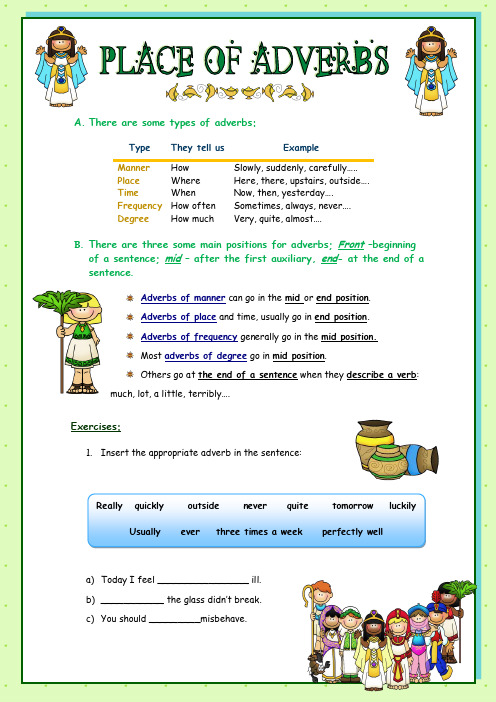
A. There are some types of adverbs: Type They tell usExample Manner Place Time FrequencyDegree How Where When How often How much Slowly, suddenly, carefully….. Here, there, upstairs, outside…. Now, then, yesterday…. Sometimes, always, never…. Very, quite, almost….B. There are three some main positions for adverbs; Front –beginning of a sentence; mid – after the first auxiliary, end - at the end of a sentence .Adverbs of manner can go in the mid or end position .Adverbs of place and time, usually go in end position .Adverbs of frequency generally go in the mid position.Most adverbs of degree go in mid position .Others go at the end of a sentence when they describe a verb :much, lot, a little, terribly….Exercises:1. Insert the appropriate adverb in the sentence:a) Today I feel ________________ ill.b) ___________ the glass didn’t break.c) You should _________misbehave.Really quickly outside never quite tomorrow luckily Usually ever three times a week perfectly welle)Do you want to go to the cinema ______________?f)Peter ran _________ when the fire broke out.g)It ________ rains when I wash my car.h)I practise fitness training _____________.i)Have you ________ gone to Italy before?j)You know __________ what I think about your boyfriend.k)I’ve __________ enjoyed all the story lessons.plete the sentences. Put the words (on the right) in the bestorder.a)She just sat ………b)We have visited the fair …….c)Albert went ……..d)I like England……e) I spent a month …….f) You can park your car ……By the river all day Two years agoto México very much in August therein the garden peacefully regularly since 1996A. There are some types of adverbs:Type They tell usExample Manner Place Time FrequencyDegree How Where When How often How much Slowly, suddenly, carefully….. Here, there, upstairs, outside…. Now, then, yesterday…. Sometimes, always, never…. Very, quite, almost….B. There are three some main positions for adverbs; Front –beginning of a sentence; mid – after the first auxiliary, end - at the end of a sentence .Adverbs of manner can go in the mid or end position .Adverbs of place and time, usually go in end position .Adverbs of frequency generally go in the mid position.Most adverbs of degree go in mid position . Others go at the end of a sentence when they describe averb : much, lot, a little, terribly….Exercises:3. Insert the appropriate adverb in the sentence:l) Today I feel ________________ ill.m) ___________ the glass didn’t break.n) You should _________misbehave.Really quickly outside never quite tomorrow luckily Usually ever three times a week perfectly wellp)Do you want to go to the cinema ______________?q)Peter ran _________ when the fire broke out.r)It ________ rains when I wash my car.s)I practise fitness training _____________.t)Have you ________ gone to Italy before?u)You know __________ what I think about your boyfriend.v)I’ve __________ enjoyed all the story lessons.plete the sentences. Put the words (on the right) in the bestorder.e)She just sat ………f)We have visited the fair …….g)Albert went ……..h)I like England……e) I spent a month …….f) You can park your car ……By the river all day Two years agoto México very much in August therein the garden peacefully regularly since 1996。
完整版)英语语法术语中英文对照表
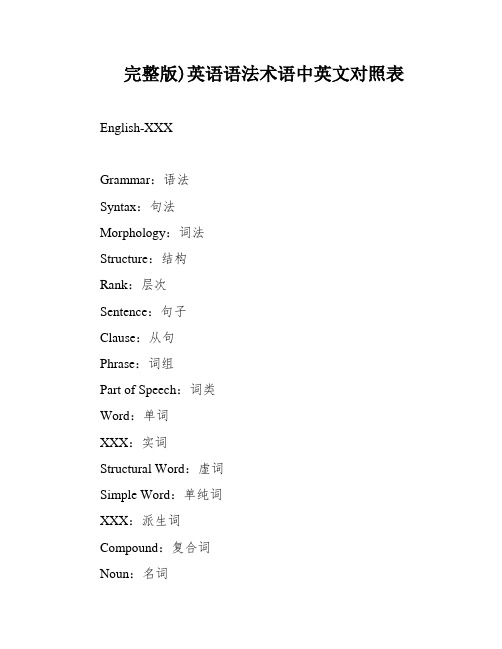
完整版)英语语法术语中英文对照表English-XXXGrammar:语法Syntax:句法Morphology:词法Structure:结构Rank:层次Sentence:句子Clause:从句Phrase:词组Part of Speech:词类Word:单词XXX:实词Structural Word:虚词Simple Word:单纯词XXX:派生词Compound:复合词Noun:名词Proper Noun:专有名词Common Noun:普通名词Countable Noun:可数名词Uncountable Noun:不可数名词Abstract Noun:抽象名词Concrete Noun:具体名词Material Noun:物质名词Collective Noun:集体名词Individual Noun:个体名词n:介词n:连词XXX:动词Main XXX:主动词XXX:及物动词Intransitive XXX:不及物动词Link XXX:系动词Auxiliary XXX:助动词Modal XXX:情态动词Regular Verb:规则动词Irregular Verb:不规则动词Phrasal XXX:短语动词XXX:限定动词Infinite XXX:非限定动词Causative Verb:使役动词Verb of Senses:感官动词Event Verb:动态动词XXX:静态动词XXX:感叹词Adjective:形容词Adverb:副词Adverb of Manner:方式副词Adverb of Degree:程度副词Adverb of Time:时间副词Adverb of Place:地点副词Adjunct:修饰性副词Conjunct:连接性副词Interrogative Adverb:疑问副词Relative Adverb:关系副词Pronoun:代词Personal Pronoun:人称代词Possessive Pronoun:物主代词Reflexive Pronoun:反身代词Reciprocal Pronoun:相互代词Demonstrative Pronoun:指示代词Pronouns are words used in place of nouns。
初一英语副词单选题30题
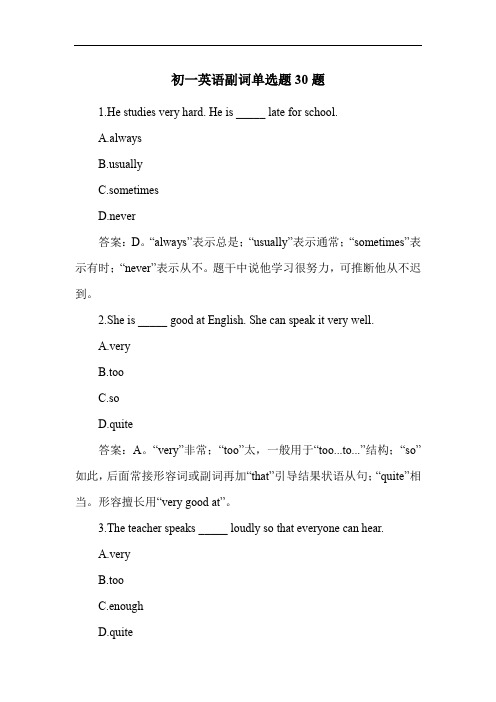
初一英语副词单选题30题1.He studies very hard. He is _____ late for school.A.alwaysuallyC.sometimesD.never答案:D。
“always”表示总是;“usually”表示通常;“sometimes”表示有时;“never”表示从不。
题干中说他学习很努力,可推断他从不迟到。
2.She is _____ good at English. She can speak it very well.A.veryB.tooC.soD.quite答案:A。
“very”非常;“too”太,一般用于“too...to...”结构;“so”如此,后面常接形容词或副词再加“that”引导结果状语从句;“quite”相当。
形容擅长用“very good at”。
3.The teacher speaks _____ loudly so that everyone can hear.A.veryB.tooC.enoughD.quite示过度;“enough”足够,修饰副词放在副词后;“quite”相当。
4.He runs _____ fast in the PE class.A.veryB.reallyC.quiteD.too答案:B。
“very”“quite”一般修饰形容词;“too”表示过度;“really”确实,可修饰副词“fast”。
5.She is _____ happy to see her old friends.A.veryB.quiteC.soD.too答案:A。
“very”非常;“quite”相当;“so”如此,后面常接形容词或副词再加“that”引导结果状语从句;“too”太,一般用于“too...to...”结构。
形容开心用“very happy”。
6.The music in the classroom is _____ loud.A.veryB.tooC.quiteD.enough度;“quite”相当;“enough”足够,修饰形容词放在形容词后。
Adverbs of Manner副词的用法
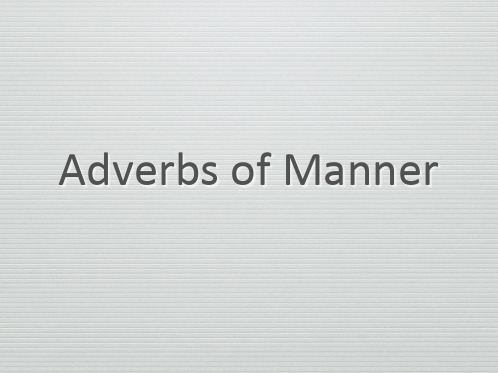
Adverbs of Manner
What’s an adverb of manner?
It tells how something is done.
My mom speaks English poorly. He plays volley‐ball well.
You eat food so slowly.
[2] Study for a test
[3] Ride you bicycle [4] Clean your room [5] Eat your food [6] Cook food [7] Act towards your teachers [8] Act towards your enemies
[1] The bed is very < soft / softly > so I can sleep very well. [2] He can play sports < good / well > because he is strong. [3] The homework was < easy / easily > and I finished it fast. [4] Please walk < quiet / quietly > because mom is sleeping. [5] My friends are < angry / angrily > that I didn't help them. [6] Danny looks < happy / happily > today.
Why do we use “adverbs”? [FUNCTION]
状语
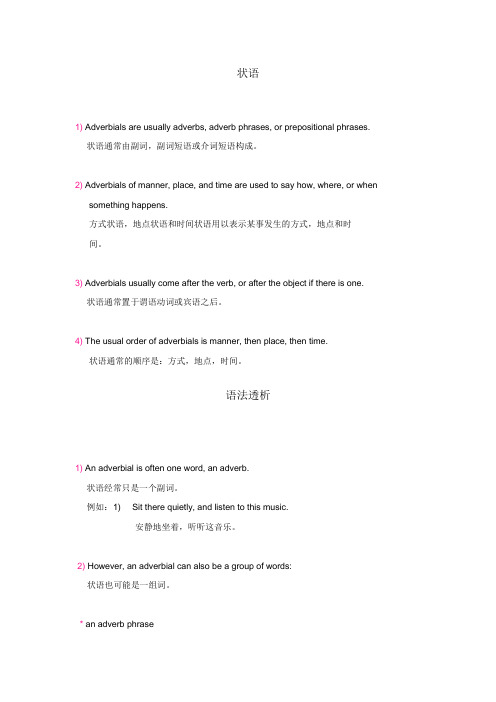
状语1) Adverbials are usually adverbs, adverb phrases, or prepositional phrases.状语通常由副词,副词短语或介词短语构成。
2) Adverbials of manner, place, and time are used to say how, where, or whensomething happens.方式状语,地点状语和时间状语用以表示某事发生的方式,地点和时间。
3) Adverbials usually come after the verb, or after the object if there is one.状语通常置于谓语动词或宾语之后。
4) The usual order of adverbials is manner, then place, then time.状语通常的顺序是:方式,地点,时间。
语法透析1) An adverbial is often one word, an adverb.状语经常只是一个副词。
例如:1) Sit there quietly, and listen to this music.安静地坐着,听听这音乐。
2) However, an adverbial can also be a group of words:状语也可能是一组词。
* an adverb phrase副词词组例如:1) He did not play well enough to win.他弹得不够好,没能胜出。
* a prepositional phrase介词词组例如:1) The children were playing in the park.孩子们在公园玩耍。
* a noun group, usually a time expression名词词组,通常表示时间例如:1) Come and see me next week.下周来看我。
初中英语副词带例句

初中英语副词带例句Adverbs are an essential part of speech in the English language. They modify verbs, adjectives, and other adverbs, providing more information about when, where, how, and to what extent an action is performed. In this article, we will explore the use of adverbs in the context of middle school English education, providing examples to help students better understand how to use them effectively in their writing and communication.To begin with, adverbs of manner are used to describe how an action is performed. For example, in the sentence "She sings beautifully," the adverb "beautifully" describes the manner in which she sings. Other examples of adverbs of manner include "quickly," "carefully," and "loudly." These adverbs add detail to the verb and help paint a clearer picture of the action taking place.Next, adverbs of frequency indicate how often an action occurs. For instance, in the sentence "I always brush my teeth before bed," the adverb "always" shows the frequency of the action. Similarly, "often," "sometimes," and "rarely" are all adverbs of frequency that provide information about the regularity of an action.Adverbs of time are used to convey when an action takes place. For example, in the sentence "We will meet tomorrow," the adverb "tomorrow" specifies the time of the meeting. Other adverbs of time include "today," "yesterday," "soon," and "now," all of which help situate actions within a specific timeframe.Adverbs of place indicate where an action occurs. In the sentence "The cat is hiding upstairs," the adverb "upstairs" specifies the location of the cat. Similarly, "here," "there," "everywhere," and "abroad" are adverbs of place that help provide context for the action being described.In addition, adverbs of degree modify adjectives and other adverbs to indicate the extent or degree of the action. For instance, in the sentence "She is extremely talented," the adverb "extremely" enhances the adjective "talented." Other examples of adverbs ofdegree include "very," "too," "quite," and "almost," all of which add nuance to the description of the action.Furthermore, adverbs can also be used to modify an entire sentence or clause. These adverbs, known as sentence adverbs, provide information about the speaker's attitude, opinion, or evaluation of the action. For example, in the sentence "Fortunately, the rain stopped in time for the picnic," the adverb "fortunately" conveys the speaker's positive sentiment about the rain stopping. Similarly, "unfortunately," "happily," and "surprisingly" are all examples of sentence adverbs that add a layer of meaning to the entire sentence.In conclusion, adverbs play a crucial role in providing additional information and context to the actions and descriptions in the English language. By understanding the different types of adverbs and how they function, students can improve their writing and communication skills. With the help of examples and practice, students can learn to use adverbs effectively to enhance the clarity and depth of their expression. As students continue to develop their language skills, a strong grasp of adverbs will undoubtedly contribute to their overall proficiency in English.。
大学英语语法4——副词

Many adverbs are formed by adding –ly to an adjective: • general --- generally, bad --- badly, • soft --- softly, definite --- definitely, • happy --- happily, frequent --- frequently Like adjectives, some adverbs have three forms of comparison: positive, comparative, and superlative. Positive Comparative Superlative badly worse worst far farther/further farthest/furthest fore former foremost/first late later latest/last little less least much more most well better best
3. Order of adverbs
Usual word order with different adverbs is: manner + place + time • She sang beautifully in the bathroom last night. night. • The murder escaped quickly from the village at dusk. dusk. As a general rule, shorter adverbial phrases go before longer adverbial phrases, regardless of content. • The cat takes a walk after super every day of its life. life. • He will wait for us at six at the west gate of the university. university.
高中英语倒装句的12种用法

+Can you speak French? (Can you speak French?)
Partial inversion
Only auxiliary verbs or modal verbs are placed before the subject, while the predicate verb remains in its normal position, forming a partially inverted sentence.
要点二
The characteristics of inverted sentences
By using inverted structures, inverted sentences can emphasize specific components in the sentence, change the focus of the sentence, and make the language more vivid and powerful.
11
Analysis of typical example sentences
In front of the house stands a tall tree (There is a tall tree in front of the house.)
Out rusted the boy (The boy rushed out.)
• Misconception 2: Neglecting tense and voice changes in inverted sentences. When using inverted sentences, attention should still be paid to the tense and voice changes of the predicate verb.
初中英语语法 副词如何表示方式或手段

初中英语语法副词如何表示方式或手段初中英语语法知识点:副词如何表示方式或手段副词在英语语法中起到修饰动词、形容词、副词等词性的作用。
它们可以用来表示方式或手段,描述行为或事件是如何进行的。
在初中英语中,我们常用一些特定的副词来表示方式或手段。
以下是一些常见的副词及其用法:1. Adverb of Manner(方式副词):- carefully(小心地):She walked carefully on the slippery road.- quickly(迅速地):He ran quickly to catch the bus.- quietly(安静地):Please speak quietly in the library.- slowly(慢慢地):The turtle moves slowly across the sand.2. Adverb of Means(手段副词):- by(通过):We can communicate by email.- with(用):She cut the paper with scissors.- using(使用):He fixed the broken chair using glue.- by means of(借助于):We can learn a lot by means of the internet.3. Adverb of Instrument(工具副词):- by hand(手工):She made the dress by hand.- with a brush(用刷子):He painted the wall with a brush.- using a calculator(使用计算器):They solved the math problem using a calculator.- by computer(通过电脑):We can type the report by computer.4. Adverb of Technique(技术副词):- skillfully(熟练地):She played the piano skillfully.- carefully(仔细地):He followed the instructions carefully.- accurately(准确地):The scientist measured the temperature accurately.- efficiently(高效地):They completed the task efficiently.5. Adverb of Process(过程副词):- gradually(逐渐地):The colors of the sunset changed gradually.- systematically(系统地):He organized his notes systematically.- step by step(一步一步地):She followed the recipe step by step.- slowly but surely(缓慢但稳定地):He made progress slowly but surely.以上是初中英语中常见的副词表示方式或手段的用法。
英语专业术语

The Appositive
补语
The Complement
直接宾语
The Direct Object
间接宾语
The Indirect Object
直接引语
Direct Speech
间接引语
Indirect Speech
独立结构
Independent Elements
主句
Main Clauses
过去分词
The Past Participle
不定式
Trund
副词
Adverb
时间副词
Adverb of Time
地点副词
Adverb of Place
方式副词
Adverb of Manner
程度副词
Adverb of degree
频率副词
Adverb of Frequency
简单句
Simple Sentence
并列句
Compound Sentence
复合句
Comple Sentence
省略句
Elliptical Sentence
一般现在时
Simple Present Tense
一般过去时
Past Simple Tense
一般将来时
Simple Future Tense
一般过去将来时
词缀
Affixation
前缀
Prefix
后缀
Suffix
所有格
Possessive Case
主格
Nominative Case
宾语
Objective Case
第一人称
First Person
英语五种句型试题及答案

英语五种句型试题及答案一、选择题1. The sentence "He gave me a book" is an example of which type of sentence?A. Subject-Verb-Object (SVO)B. Subject-Object-Verb (SOV)C. Verb-Subject-Object (VSO)D. Object-Subject-Verb (OSV)2. In the sentence "She is reading a novel," which part is the verb?A. SheB. is readingC. a novelD. a3. Which sentence structure is not one of the five basic English sentence types?A. Subject-Verb-Complement (SVC)B. Subject-Verb-Indirect Object-Direct Object (SVIDO)C. Subject-Verb-Adverbial (SVA)D. Subject-Verb-Object-Object (SVOO)4. The phrase "in the morning" is an example of which type of adverbial?A. Adverb of timeB. Adverb of placeC. Adverb of mannerD. Adverb of degree5. Identify the correct sentence type for "They have been working hard all day."A. SVCB. SVOC. SVAD. SVIDO二、填空题6. The basic sentence structure of "She sings beautifully" is _______.[Answer: SVC]7. In the sentence "The teacher handed the student a book," the direct object is _______.[Answer: a book]8. The sentence "He has finished his homework" is an example of a _______ structure.[Answer: SVO]9. "Quickly" is an adverb modifying the verb "run" in the sentence "He ran quickly to the store." What type of adverb is it?[Answer: Adverb of manner]10. The sentence "We elected him president" follows the structure of _______.[Answer: SVIDO]三、改错题11. The cat chased the mouse quickly. (Change the sentence to an SVO structure)[Answer: The cat quickly chased the mouse.]12. She is a teacher. (Change the sentence to an SVA structure)[Answer: She is a teacher here.]13. They gave the book to me. (Change the sentence to an SVIDO structure)[Answer: They gave me the book.]14. He is working hard. (Change the sentence to an SVC structure)[Answer: He is hardworking.]15. The children played in the park. (Change the sentence to an SVA structure)[Answer: The children played happily in the park.]四、简答题16. What is the basic structure of a sentence in English?[Answer: The basic structure of a sentence in English is Subject-Verb-Object (SVO).]17. Explain the difference between a direct object and an indirect object in a sentence.[Answer: A direct object is the noun or pronoun that receives the action of the verb, while an indirect object is the noun or pronoun that indicates to whom or for whom theaction is done.]18. Provide an example of a sentence with an adverbial of place.[Answer: An example of a sentence with an adverbial of place is "She hid the treasure in the cave."]19. How many basic sentence types are there in English, and what are they?[Answer: There are five basic sentence types in English: Subject-Verb (SV), Subject-Verb-Object (SVO), Subject-Verb-Complement (SVC), Subject-Verb-Indirect Object-Direct Object (SVIDO), and Subject-Verb-Adverbial (SVA).]20. What is the function of an adverbial in a sentence?[Answer: The function of an adverbial in a sentence is to provide additional information about the verb, such as time, place, manner, or degree.]。
Adverbials全英解析

AdverbialsWhy do we use adverbials?We use adverbs to give more information about the verb.We use adverbials of manner to say how something happens or how something is done:The children were playing happily.He was driving as fast as possible.We use adverbials of place to say where something happens:I saw him there.We met in London.We use adverbials of time to say when or how often something happens:They start work at six thirty.They usually go to work by bus.We use adverbials of probability to show how certain we are about something.∙Perhaps the weather will be fine.∙He is certainly coming to the party.1.how we make adverbialsAn adverbial can be an adverb:He spoke angrily.They live here.We will be back soon.or an adverb with a quantifier:He spoke really angrily.They live just here.We will go quite soon.We will go as soon as possible.or a phrase with a preposition:He spoke in an angry voice.They live in London.We will go in a few minutes.2.where they go in a sentenceWhere do adverbials go in a sentence?We normally put adverbials after the verb:He spoke angrily.They live just here.We will go in a few minutes.or after the object or complement:But adverbials of frequency (how often) usually come in front of the main verb:But if we want to emphasise an adverbial we can put it at the beginning of a clause:Last night we saw our friends.In a few minutes we will go.Very quietly he opened the door.If we want to emphasise an adverb of manner we can put it in front of the main verb:3.adverbs of mannerAdverbs of manner are usually formed from adjectives by adding –ly:bad> badly; quiet > quietly; recent > recently; sudden > suddenlybut there are sometimes changes in spelling:easy> easily; gentle > gentlyIf an adjective ends in –ly we use the phrase in a …. way to express manner:Silly > He behaved in a silly way.Friendly > She spoke in a friendly way.A few adverbs of manner have the same form as the adjective:They all worked hard.She usually arrives late.I hate driving fast.Note: hardly and lately have different meanings:He could hardly walk = It was difficult for him to walk.I haven’t seen John lately = I haven’t seen John recently.We often use phrases with like as adverbials of manner:Adverbs of manner and link verbsWe very often use adverbials with like after link verbs:But we do not use other adverbials of manner after link verbs. Weuse adjectives instead:4.adverbials of placeWe use adverbials of place to describe:LocationWe use prepositions to talk about where someone or something is.Examples:∙He was standing by the table.∙You’ll find it in the cupboard.∙Sign your name here –at the bottom of the page.DirectionWe use adverbials to to talk about the direction where someone or something is moving.Examples:∙Walk past the bank and keep going to the end of the street.∙The car door is very small so it’s difficult to get into.DistanceWe use adverbials to show how far things are:Examples:∙Birmingham is 250 kilometres from London.∙We were in London. Birmingham was 250 kilometres away.1) adverbials of locationLocationWe use prepositions to talk about where someone or something is:He was standing by the table.She lives in a village near Glasgow.You’ll find it in the cupboard.We use phrases with of as prepositions:There were some flowers in the middle of the table.Sign your name here –at the bottom of the page.I can’t see. You’re standing in front of me.We can use right as an intensifier with some of these prepositions:He was standing right next to the table.There were some flowers right in the middle of the table.There’s a wood right behind our house.2) adverbials of directionDirectionWe also use prepositional phrases to talk about direction:She ran out of the house.Walk past the bank and keep going to the end of the street. We also use adverbs and adverb phrases for place and direction:I would love to see Paris. I’ve never been there.The bedroom is upstairs.It was so cold that we stayed indoors.We often have a preposition at the end of a clause:This is the room we have our meals in.The car door is very small so it’s difficult to get into.I lifted the carpet and looked underneath.3) adverbials of distanceDistanceWe use adverbials to show how far things are:Birmingham is 250 kilometres from London.Birmingham is 250 kilometres away from London.It is 250 kilometres from Birmingham to London. Sometimes we use a preposition at the end of a clause:We were in London. Birmingham was 250 kilometres away.Birmingham was 250 kilometres off.5. adverbials of timeWe use adverbials of time to say:•when something happened:I saw Mary yesterday.She was born in 1978.I will see you later.There was a storm during the night.• for how long :We waited all day.They have lived here since 2004.We will be on holiday from July 1st until August 3rd. •how often (frequency):They usually watched television in the evening.We sometimes went to work by car.We often use a noun phrase as a time adverbial:1) time and datesWe use phrases with prepositions as time adverbials:• We use at with:clock times: at seven o’clock - at nine thirty - at fifteen hundred hoursmealtimes: at breakfast - at lunchtime - at teatime… and in these phrases:at night - at the weekend - at Christmas - at Easter• We use in with:seasons of the year: in spring/summer/autumn/winter - in the spring/summer/autumn/winteryears and centuries: in 2009 -in 1998 - in the twentieth centurymonths: in January/February/March etc.parts of the day: in the morning - in the afternoon - in the evening.• We use on with:days: on Monday/Tuesday/Wednesday etc - on Christmas day - on my birthday.dates: on the thirty first of July - on June 15thNote: We say at night when we are talking about all of the night:When there is no moon it is very dark at night.He sleeps during the day and works at night.but we say in the night when we are talking about a short time during the night:He woke up twice in the night.I heard a funny noise in the night.We use the adverb ago with the past simple to say how long before the time of speaking something happened:I saw Jim about three weeks ago.We arrived a few minutes ago.We can put time phrases together:2) how longWe use for to say how long:We have been waiting for twenty minutes.They lived in Manchester for fifteen years.We use since with the present perfect or the past perfect to say when something started:I have worked here since December.They had been watching since seven o’clock in the morning.We use from …to/until to say when something starts and finishes:They stayed with us from Monday to Friday.We will be on holiday from the sixteenth until the twentieth.3) how oftenThe commonest adverbials of frequency are:We usually put adverbials of frequency in front of the main verb:but they usually come after the verb be:We use the adverbial a lot to mean often or frequently. It comes at the end of the clause:We go to the cinema a lot.but before another time adverbial:We go to the cinema a lot at the weekend.We use much with a negative to mean not often:We do n’t go out much. (= We don’t go out often)We use how often or ever to ask questions about frequency. How often comes atthe beginning of the clause:How often do you go to the cinema?How often have you been here?ever comes before the main verb:Longer frequency phrases, like every year or three times a day usually come at the end of the clause:I have an English lesson twice a week.She goes to see her mother every day.6. already, still, yet and no longerWe use still to show that something continues up to a time in the past present or future. It goes in front of the main verb:… or after the present simple or the past simple of be:We use already to show that something has happened sooner than it was expected to happen. Like still, it comes before the main verb:… or after the present simple or past simple of the verb be:We use yet in a negative or interrogative clause, usually with perfective aspect (especially in British English), to show that something has not happened by a particulartime. yet comes at the end of the sentence:It was late, but they hadn’t arrived yet.Have you fixed the car yet?She won’t have sent the email yet.7. adverbials of probabilityAdverbials of probabilityWe use adverbials of probability to show how certain we are about something. The most frequent adverbials of probability are:certainly - definitely - maybe - possiblyclearly - obviously - perhaps - probablymaybe and perhaps usually come at the beginning of the clause:Perhaps the weather will be fine.Maybe it won’t rain.Other adverbs of possibility usually come in front of the main verb:8. comparative adverbsWe can use comparative adverbs to show change or to make comparisons:I forget things more often nowadays.She began to speak more quickly.They are working harder now.We often use than with comparative adverbsI forget things more often than I used to.Girls usually work harder than boys.Intensifiers:We use these words and phrases as intensifiers with these patterns:much - far - a lot - quite a lot - a great deal - a good deal - a good bit - a fair bitI forget things much more often nowadays.Mitigators:We use these words and phrases as mitigators:a bit - just a bit - a little - a little bit - just a little bit - slightlyShe began to speak a bit more quickly9. superlative adverbsWe can use superlative adverbs to make comparisons:His ankles hurt badly, but his knees hurt worst.It rains most often at the beginning of the year.Intensifiers:When we intensify a superlative adverb we often use the in front of the adverb, and we use these words and phrases as intensifiers:easily - much - far - by far。
Unit1 Extended reading词汇课件 高中英语译林牛津版必修第一册

or service.
vt.说服;使信服
换言之,广告试图说服人们购买一种产品或服务。
① It tries to persuade people into accepting/to accept
advertisers’ idea.
persuade
②We need to persuade ourselves not to be persuaded/out of
⑥Our English teacher is very strict with us.He won't have us _g_e_t_t_in_g__a_w_a_y__w_i_th__
cheating in the exam. 作弊,欺骗
5.The + 比较级... , the + 比较级... “越...,就越...”
从……中吸收……
absorb ...into ...
把……吸收ab进s…or…b
(be) absorbed in ...=absorb oneself in ... 专心于/全神贯注于..
absorb one's attention
吸引某v吸人t.引理的全解注部,意注掌力意握力;吸收;
①Flowers can absorb sunlight from the sun.
being persuaded.
vt.说服;使信服
persuasive
adj. 有说服力的, 令人信服的
persuade
vt. 说服,使信服
persuasion
n. 说服,劝说,信 仰
说服某人做某事 persuade sb. to do ... persuade sb. into doing ...
adverb

Adverbs of frequency
Adverbs of frequency
Adverbs and expressions of frequency I go running.
Questions about frequency
Adverbs of degree
放在所修饰的名词,形容词,或副词之前。 她的英语很好。 Her English is very good. 她唱歌唱的很好。 She sings quite well. 我非常喜欢它。 I like it very much. She swims well. (very) The dress is nice. (pretty) The boy is tall. (so)
Adverbs of place
通常放在句子的末尾。 外面很冷。 It is cold outside.
先地点副词,再时间副词。 我的一个同学明天会来这里。 One of my classmates will come here tomorrow.
Adverbs of manner
放在所修饰的动词后面。 他们工作很努力。 They work very hard.
放在宾语后面。 他小心地拿着鸡蛋。 He carried the eggs carefully. Could you sing the song loudly?
Adverbs of manner
I speak quietly. He speaks loudly.
How to form:
Irregular form:
Adverbs 副词
He speaks well. The house is very big. He runs really fast. Hopefully, we'll meet again on Thursday.
运动副的基本类型

运动副的基本类型一、引言运动副 (adverb of manner) 是英语中一类非常常见的副词类型,用于修饰动词,描述动作的方式、方式和程度。
通过合理运用运动副,能够使句子更生动、更具表达力。
本文将详细介绍运动副的基本类型及其在句子中的应用。
二、基本类型运动副可以分为以下几种基本类型:2.1 方式副 (Adverbs of Manner)方式副用于描述行为或动作的方式。
它回答了“如何”和“以什么方式”这样的问题。
例如:•She sings beautifully. (她唱得很美)•He spoke quietly. (他轻声说话)常见的方式副有: - beautifully (美丽地) - quickly (快速地) - softly (轻轻地)2.2 程度副 (Adverbs of Degree)程度副用于描述动作的程度或强度。
它回答了“多么”和“到什么程度”这样的问题。
例如:•The weather is extremely hot. (天气非常热)•He is very tall. (他个子很高)常见的程度副有: - extremely (极其) - very (非常) - quite (相当)2.3 频率副 (Adverbs of Frequency)频率副用于描述动作发生的频率。
它回答了“多久一次”这样的问题。
例如:•I often go to the gym. (我经常去健身房)•She rarely eats fast food. (她很少吃快餐)常见的频率副有: - often (经常) - sometimes (有时候) - rarely (很少)2.4 地点副 (Adverbs of Place)地点副用于描述动作发生的地点。
它回答了“在哪里”这样的问题。
例如:•They are waiting outside. (他们在外面等候)•The cat is hiding underneath the table. (猫藏在桌子下面)常见的地点副有: - outside (外面) - underneath (下面) - here (这里)三、运动副的应用运动副在句子中的应用非常广泛,在不同的语境下有不同的用法。
现代大学英语精读3 unit4 答案
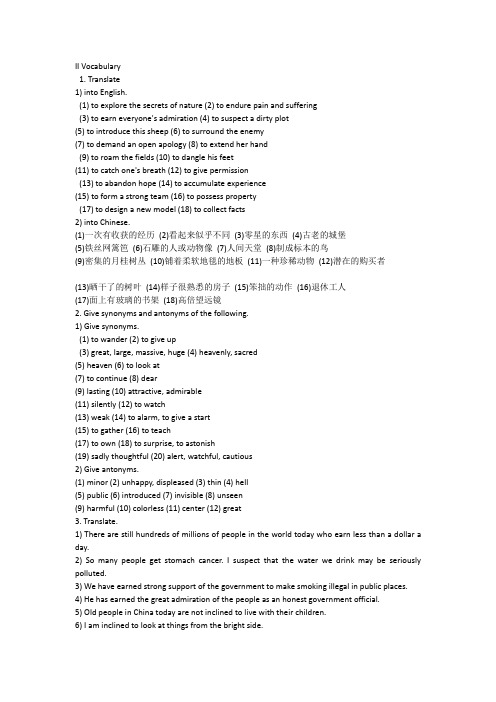
II Vocabulary1. Translate1) into English.(1) to explore the secrets of nature (2) to endure pain and suffering(3) to earn everyone's admiration (4) to suspect a dirty plot(5) to introduce this sheep (6) to surround the enemy(7) to demand an open apology (8) to extend her hand(9) to roam the fields (10) to dangle his feet(11) to catch one's breath (12) to give permission(13) to abandon hope (14) to accumulate experience(15) to form a strong team (16) to possess property(17) to design a new model (18) to collect facts2) into Chinese.(1)一次有收获的经历(2)看起来似乎不同(3)零星的东西(4)古老的城堡(5)铁丝网篱笆(6)石雕的人或动物像(7)人间天堂(8)制成标本的鸟(9)密集的月桂树丛(10)铺着柔软地毯的地板(11)一种珍稀动物(12)潜在的购买者(13)晒干了的树叶(14)样子很熟悉的房子(15)笨拙的动作(16)退休工人(17)面上有玻璃的书架(18)高倍望远镜2. Give synonyms and antonyms of the following.1) Give synonyms.(1) to wander (2) to give up(3) great, large, massive, huge (4) heavenly, sacred(5) heaven (6) to look at(7) to continue (8) dear(9) lasting (10) attractive, admirable(11) silently (12) to watch(13) weak (14) to alarm, to give a start(15) to gather (16) to teach(17) to own (18) to surprise, to astonish(19) sadly thoughtful (20) alert, watchful, cautious2) Give antonyms.(1) minor (2) unhappy, displeased (3) thin (4) hell(5) public (6) introduced (7) invisible (8) unseen(9) harmful (10) colorless (11) center (12) great3. Translate.1) There are still hundreds of millions of people in the world today who earn less than a dollar a day.2) So many people get stomach cancer. I suspect that the water we drink may be seriously polluted.3) We have earned strong support of the government to make smoking illegal in public places.4) He has earned the great admiration of the people as an honest government official.5) Old people in China today are not inclined to live with their children.6) I am inclined to look at things from the bright side.7) The smugglers seem to know all our actions. I suspect that someone among us is passing secret information to them.8) She says that she just doesn't feel inclined to work today.9) We could not identify the body because it was too badly burnt.10) These people roam from place to place without regular jobs and without social identity. More and more people now regard it as unfair.11) I still regard it as important for our young people to care about their national identity.12) With regard to flood control, I am still inclined to think that to plant more trees is more important than anything else.4. Fill in the blanks with the appropriate words.1) B 2) D 3) A 4) A 5) D 6) D 7) B/C 8) C5. Fill in the blanks with the appropriate expression below.1) wrench myself away from it 2) care to 3) keeping to herself4) Thanks to, as it were 5) odds and ends 6) went by, at ease7) with a will 8) filled up 9) at ease 10) brim over11) bursting with 12) verges on 13) slipped through14) verges against 15) warned against, as it were6. Choose the right word in the given context.1) (1) crawl (2) climbed (3) crept (4) creep/crawl2) (1) tone (2) tune (3) tune (4) tone3) (1) extend (2) expand (3) extended (4) expand4) (1) doubt (2) suspect (3) doubted (4) suspect5) (1) lonely (2) alone (3) alone, lonely (4) alone7. Translate with special attention to the different meanings of the same word or word which happen to have the same spelling.1)讨厌鬼就是那种你希望他听的时候他却偏要说的人?2)你要是三分钟之内还打不出油,就别再钻了。
英语中状语的作用
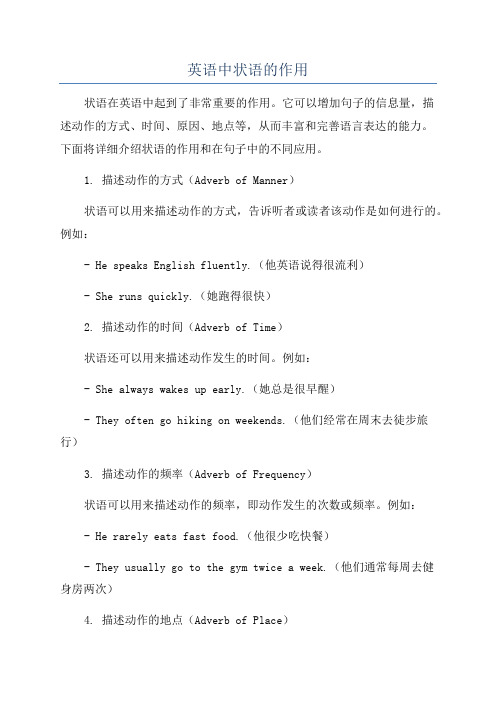
英语中状语的作用状语在英语中起到了非常重要的作用。
它可以增加句子的信息量,描述动作的方式、时间、原因、地点等,从而丰富和完善语言表达的能力。
下面将详细介绍状语的作用和在句子中的不同应用。
1. 描述动作的方式(Adverb of Manner)状语可以用来描述动作的方式,告诉听者或读者该动作是如何进行的。
例如:- He speaks English fluently.(他英语说得很流利)- She runs quickly.(她跑得很快)2. 描述动作的时间(Adverb of Time)状语还可以用来描述动作发生的时间。
例如:- She always wakes up early.(她总是很早醒)- They often go hiking on weekends.(他们经常在周末去徒步旅行)3. 描述动作的频率(Adverb of Frequency)状语可以用来描述动作的频率,即动作发生的次数或频率。
例如:- He rarely eats fast food.(他很少吃快餐)- They usually go to the gym twice a week.(他们通常每周去健身房两次)4. 描述动作的地点(Adverb of Place)状语可以表达动作发生的地点。
例如:- The cat is sleeping upstairs.(猫在楼上睡觉)- The children are playing outside.(孩子们在外面玩)5. 描述动作的原因(Adverb of Reason)状语可以用来描述动作发生的原因。
例如:- He must leave early because he has an important meeting.(他必须早点离开因为他有个重要的会议)- She apologized sincerely for her mistake.(她为自己的错误真诚地道歉)6. 描述动作的程度(Adverb of Degree)状语可以用来描述动作的程度或强度。
状语的作用
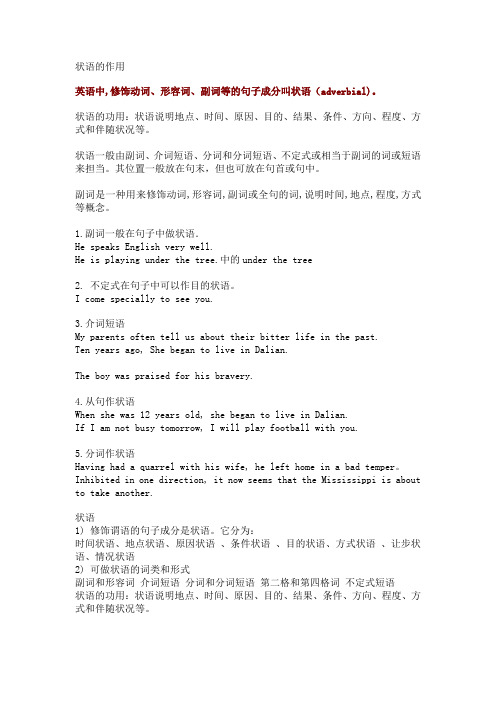
状语的作用英语中,修饰动词、形容词、副词等的句子成分叫状语(adverbial)。
状语的功用:状语说明地点、时间、原因、目的、结果、条件、方向、程度、方式和伴随状况等。
状语一般由副词、介词短语、分词和分词短语、不定式或相当于副词的词或短语来担当。
其位置一般放在句末,但也可放在句首或句中。
副词是一种用来修饰动词,形容词,副词或全句的词,说明时间,地点,程度,方式等概念。
1.副词一般在句子中做状语.He speaks English very well.He is playing under the tree.中的under the tree2. 不定式在句子中可以作目的状语。
I come specially to see you.3.介词短语My parents often tell us about their bitter life in the past.Ten years ago, She began to live in Dalian.The boy was praised for his bravery.4.从句作状语When she was 12 years old, she began to live in Dalian.If I am not busy tomorrow, I will play football with you.5.分词作状语Having had a quarrel with his wife, he left home in a bad temper。
Inhibited in one direction, it now seems that the Mississippi is about to take another.状语1) 修饰谓语的句子成分是状语。
它分为:时间状语、地点状语、原因状语、条件状语、目的状语、方式状语、让步状语、情况状语2) 可做状语的词类和形式副词和形容词介词短语分词和分词短语第二格和第四格词不定式短语状语的功用:状语说明地点、时间、原因、目的、结果、条件、方向、程度、方式和伴随状况等。
- 1、下载文档前请自行甄别文档内容的完整性,平台不提供额外的编辑、内容补充、找答案等附加服务。
- 2、"仅部分预览"的文档,不可在线预览部分如存在完整性等问题,可反馈申请退款(可完整预览的文档不适用该条件!)。
- 3、如文档侵犯您的权益,请联系客服反馈,我们会尽快为您处理(人工客服工作时间:9:00-18:30)。
情狀副詞
•單元目標
1.知道情狀副詞形成的原則
2.知道情狀副詞在句中的位置及用法
情狀副詞形成的原則(adj. -» adv.)
1.形式完全改變
Good well
2.形式完全一樣
early early
fast fast
late late
3.字尾是le時,先去掉e, 再+y
comfortable comfortably
(adj. -» adv.)
4.在形容詞字尾+ly
active actively beautiful beautifully sad sadly careful carefully
bad badly
safe safely
cold coldly
quick quickly
(adj. -» adv.)
5.字尾是子音+y時,去掉y,再+ily easy easily
happy happily
heavy heavily
hungry hungrily
lucky luckily
情狀副詞的位置和用法•位於一般動詞之後,用來修飾該動詞的狀
或性質
Ex:(1) Bill cried sadly.
(sadly 修飾cry)
Ex:(2) He always speaks carefully.
(carefully 修飾speak)
選出句中的情狀副詞
1. He still remembers that day well.
2. It started to rain heavily.
3. They got there safely.
4. Sam’s family went home quickly.well
heavily
safely
quickly
請將形容詞改為副詞填入句中
1.She runs ______. (fast)
2. She reads ________. (careful)
3. She teaches ______. (good)
4. He got up _____ this morning. (late)
5. He plays the piano _______. (beautiful)
6. She went to school _____ yesterday. (early)
fast, carefully, well
late, beautifully, early
請將形容詞改為副詞填入句中
7. He talked to Mary ______ last Sunday. (happy)
8. He came to the classroom ______. (quick)
9. He did ____ in the English test. (bad)
10. She is sitting ______ when she is watching TV. (comfortable)
Happily, quickly
Badly, comfortably。
